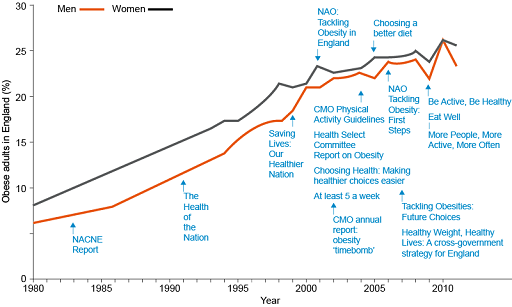7 Qualitative research

The graph in Figure 8 depicts quantitative data showing the growing prevalence of obesity in England, as well as the anti-obesity reports and interventions that have been undertaken since the 1980s. As the graph illustrates, obesity has remained a salient issue because of the health risks associated with it and the various government initiatives developed. This suggests that obesity is a complex challenge, and one that is likely to remain an issue for the foreseeable future. Qualitative research can assist us in the endeavour to more fully understand obesity as an issue.
How people experience their health is highly subjective. For example, how does a person quantify their experience of pain? Or how does someone verify that they are in ‘poor health’? Because of the subjective nature of health and wellbeing generally, and obesity specifically, research methods need to delve into the meaning and reasons behind why a person struggles to lead a healthy lifestyle. Qualitative research can help to gain these insights because this form of research can provide ‘an in-depth and interpreted understanding of the social world, by learning about people’s social and material circumstances, their experiences, perspectives and histories’, which is influenced ‘by the need to understand the meanings that people attach to their own experiences’ (Snape and Spencer, 2003, p. 22).
Qualitative research tends to be associated with smaller-scale studies that involve fewer participants than quantitative studies and aims to provide a full and more holistic understanding of research participants’ views and actions (Snape and Spencer, 2003). In qualitative research, words rather than numbers are the unit of analysis, and examples of qualitative evidence or data include using the following methods:
- Participant observation involves the researcher systematically describing events and behaviours in the setting of their chosen study. For instance, in fieldwork conducted in a South Australian community that has experienced significant socio-economic disadvantage, researchers detailed how the ‘problem of fat’ is countered from the experience of the people targeted by obesity interventions (Zivkovic et al., 2018).
- In-depth individual interviews attempt to explore the world from the perspective of the people studied. This methodology was used in a study where 27 self-identified ‘fat’ pregnant women and new mothers were asked what it was like for them to be on the ‘receiving end’ of debates and practices in maternity care that problematise their bodies (Parker, 2017).
- Focus groups are interviews with a group of people who are asked to explore their views on a topic. For example, in one project researchers conducted four focus groups to ask overweight and obese women from disadvantaged neighborhoods in the United States about their views on barriers to exercise and healthy eating (Baruth et al., 2014).
- Analysis of documents or texts involves the researcher studying selected written texts on a subject in detail. For instance, Lingetun and colleagues reviewed 13 internet blogs to understand what overweight or obese pregnant women wrote about in their pregnancy blogs (Lingetun et al., 2017).
Some common features of qualitative research include the following:
- Providing a means of connecting ‘lay knowledge’ with that of the expert. For example, researchers gathered the views of residents in a socio-economically deprived area (a former mining community). They did so to assist a Welsh local authority that had considerable expertise, but wanted to know how decisions on the future of a housing estate might impact the health of residents (Elliott and Williams, 2008).
- Collecting information that provides considerable depth in terms of its detail and complexity. As an example, in a study which observed 30 mothers prepare a plate of food for their pre-school child, the mothers were asked in detail about influences on their decisions about portion sizes and their expectations around their child’s eating (Johnson et al., 2015).
- Having a ‘reflexive approach’, where the role and perspective of the researcher in the research process is acknowledged. For some researchers, reflexivity means reporting their personal experiences of the ‘field’. For instance, in her study of self-identified ‘fat’ pregnant women (mentioned above), the researcher was very open about their own role and perspective, stating ‘As a Pākehā [New Zealand European], an academic researcher, a former midwife, a mother, and a sometimes fat person, I am positioned in complex ways to the research as both insider and outsider’ (Parker, 2017, p. 25).
Qualitative research is useful in developing depth and detail around an issue such as obesity. You have already seen a clip from Hugh Fearnley-Whittingstall’s series Britain’s Fat Fight, in which a commonly used quantitative metric, BMI, was used to consider his health. In the short video in the activity that follows, Hugh is presented with the lived experience of a woman from Newcastle. From her he learns some ‘home truths’ about his large-scale ‘Newcastle Can’ project, where the city council and the production team aimed to get a whole city behind a healthy eating and exercise regime.
Activity 6 Socio-economic factors and lay knowledge
Play the following video in which Hugh speaks to a local Newcastle woman who uses her lay knowledge to provide him with useful insights into his proposed healthy lifestyle project. Then answer the questions below.

Transcript: Video 3 Hugh learns some home truths
1. How well is the ‘Newcastle Can’ project progressing (as outlined by Hugh) at the start of the clip?
Comment
Over 370 people had signed up – but despite the encouraging noises from the volunteers (wearing the ‘Newcastle Can’ vests), Hugh comments that this is ‘still a drop in the ocean’.
2. Why does the woman who challenges Hugh think he has been targeting the wrong people? Based on your knowledge from your learning so far, do you agree or disagree?
Comment
She believes Hugh is targeting the wrong people because she thinks that the people who could benefit from his project most are put off by what she thinks is a ‘posh’ group targeting and working with people in the wrong part of the city (i.e. the part of city that needs less help to become healthier).
3. Do you agree or disagree with the woman who thinks Hugh has been targeting the wrong people? Based on your knowledge from your learning, how might you go about finding research evidence from the academic literature to support your answer?
Comment
In this free course you have been introduced to quantitative and qualitative research as a ‘way of knowing’, and you have been asked to start thinking about how these methods could potentially be used to explore a particular research question. These methods could potentially answer a question such as why the ‘Newcastle Can’ project struggled to engage a city in a healthy lifestyle project. The type of research studies that are concerned with examining the effectiveness of intervention are usually known as evaluation studies. They can be either quantitative or qualitative (or sometimes both).
4. What keywords would you use in an internet search engine to find a qualitative or quantitative research study that has examined the effectiveness of an intervention aimed at reducing obesity?
Comment
You may have come up with keywords similar to the following:
- evaluation
- intervention
- obesity
- qualitative (or quantitative).
If you have time now, put these into an internet search engine and browse the first few articles that come up.
As reinforced in the video clip you watched in the previous activity, interventions or solutions to the ‘obesity epidemic’ are not straightforward. Furthermore, obesity is usually treated as the responsibility of individuals or families, and not as a social issue. This is problematic as social, cultural, political and economic factors are major contributors to obesity. Put simply, the challenge of adult obesity cannot be simply explained as being entirely ‘the individual’s fault’.
